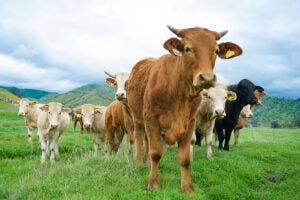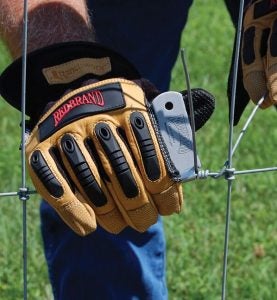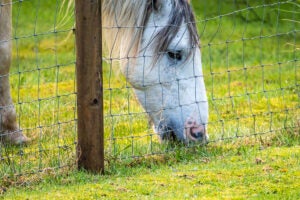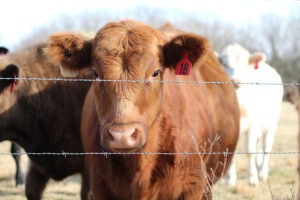A fence is an important part of a farm. It helps contain livestock and, more importantly, provides security and safety against predators, attacks, or theft.
The number of livestock in the U.S. continues to grow, with data showing that there are over 92 million cows on farms within the U.S. This places a greater need for farmers to get fencing right and protect their livestock, ensuring a high and healthy yield.
There are various fence types you can consider for your livestock. Most popular are woven field fence, horse fence, electric fence, wood and vinyl plank fence, barbed wire, and poultry wire. These fences are suitable for specific livestock, with unique safety and security benefits.
The basics you should understand about fences
A farm fence can run along the length of your farm or pasture to help contain your livestock and keep them safe. Maintenance requirements vary depending on the type of fence installed.
Often, the maintenance needs of your fence will depend on how weatherproof it is, apart from its strength. For instance, wood fences might need more regular maintenance than wire fences due to wood rot.

The strength of farm wire fences
The strength of farm fences, especially wire fences, is measured by the gauge of the wire and how the wires are secured together. Metal wires use the American Wire Gauge (AWG) rating, whereby smaller numbers indicate thicker wires.
Therefore, a 10-gauge wire is heavier than a 12-gauge wire.
The strength of a farm wire fence will also depend on how the wires are secured together. Woven wire, or mesh, is the strongest construction. Welded wire fences, where the wires are spot-welded together are generally a weaker option.
The type of fence posts you use will also determine the overall strength of your fence. For instance, oak or pine posts add strength and rigidity. However, steel posts or a combination of steel and wood posts are a common and very durable option.
How to determine your fencing needs
The following are things you should consider:
The size and type of your farm operation
Fencing costs balloon based on the size and type of your farm operation. A small farm with poultry will be much cheaper to fence than a larger farm with many head of cattle. Also, due to varying strength needs, fencing poultry will likely cost less than sheep for a similarly-sized farm.
The land you’ll be fencing
The size and condition of the property to be enclosed will affect the type and costs of your fencing. Fence installers will typically consider the environment, physical obstructions or terrain, and land use to advise on the best fence material, strength, and weatherproofing qualities.

The type of livestock
Considering you’re keeping cattle, the type of cattle you keep will affect your fencing needs. Typically, beef cattle need stronger fencing than dairy cattle. If you have exotic livestock, your fencing needs will also vary. Different horses can require alternate types of fencing based on various factors, like temperament, for instance.
Predators in the area
Your fence should be strong and secure enough to keep predators at bay, especially if you have young livestock that can fall as easy prey. Your fencing needs will vary based on the predators predominant in your area.
The fencing laws in your region
All 50 states specify unique fencing laws for livestock. Therefore, before settling on a type of fence, ensure it complies with local laws. You can use resources such as the National Agriculture Law Center’s interactive fence map to determine the state-by-state needs or check with County Extension Offices or the local government.
The various types of fences you can install on your farm
Here are the most common fences you can install in your farm based on your needs.
Woven fence
Woven fences feature interwoven wires reinforced by a knot with special crimped joints. They are the better choice for confining livestock known to ram against the fence to break loose. Several types are designed for different purposes:
- Field Fence: Field fence typically uses 12-gauge wire, though the top and bottom may comprise of heavier 10-gauge wire for extra strength and durability. It is an excellent choice for confining hogs, cattle, and other large livestock.
- Yard, Garden & Kennel: As the name suggests, this fence is a multi-purpose woven fence option. Designed with light gauge wire and 2-by-2-inch grid, it protects everything from small pets, to valuable produce, to play areas for youngsters.
- Deer and Wildlife Fence: This is a special type of knotted or woven wire fence taller than other types, typically at least six feet tall. The grid sizes are also graduated, with smaller grid squares at the floor to discourage small wildlife. A deer and wildlife fence is used primarily to keep deer and other plant-eating animals out of gardens or fields and prevent large and small predators from reaching your livestock.
Horse fence
Horse fencing is woven tight to prevent hooves from getting stuck and predators from slipping into an enclosure. Designs include a 2-by-4-inch mesh and also a v-mesh weave.

Electric fence
An electric fence is a secure and reliable farm fence that uses electricity to keep animals inside the fence perimeter and intruders or predators out.
Electric fences can also be installed in the garden or other areas where you want to keep pigs, cattle, sheep, or other animals out if your livestock are mostly free-range.
You can place an electric fence inside an ornamental wood fence or have an entire electrified wire mesh. It also serves well on top of other fence styles to enhance security.
Electric fences are not dangerous. They only produce unpleasant sensations when an animal or human brushes against them. However, use extra caution if your household includes small children.
Wood and vinyl plank
Wood fences are one of the oldest types of farm fence. Vinyl fences are a more contemporary option, designed to mitigate some drawbacks of wood farm fences, such as poor weatherproofing. Wood fences are typically budget-friendly but last for a shorter period of time. Vinyl is often less expensive than wood and will outlast it.
Barbed wire
Barbed wire is the most common type of fence for containing cattle. It usually consists of five or more horizontal strands of strong woven wire with sharp barbs. These strands are strung between wood and metal posts for rigidity.
The barbs on barbed wire prick the animals and teach them to stay within the enclosure. However, this only works with docile animals in large spaces. Larger, more aggressive livestock, predators, and wildlife such as deer can breach barbed wire. Nonetheless, they are an effective option. Barbed wire may be illegal to use in some zoning regulations. Therefore, check with local laws first.

Welded wire
This basic type of farm fence is made by spot-welding rigid wires arranged in vertical and horizontal rows. These wires typically form grid squares two inches wide and three to four inches tall.
Welded wire is not very strong since the welds can easily break. It is preferred for lightweight uses, such as protecting gardens or poultry. It can also help keep coyotes, foxes, and other small predators away from small livestock.
Poultry wire
Poultry, or chicken wire, fence is recognizable by its small-weave diamond grid pattern. It protects garden spaces and poultry enclosures. It’s lightweight, typically made from 20-gauge wire. It can also keep foxes, hawks, and other small predators at bay.
Chain link
A chain link farm fence comprises of vertical strands of metal wire linked together. Chain link fences are usually high maintenance and pose a greater risk of livestock injury due to fence failure. Despite being an available option, it’s often the least recommended for farms.
Talk to an expert
Fencing is critical if your livestock are to stay healthy, safe, and secure on your farm. With various options available, you should select the right one based on the type of livestock on your farm, predators, and local regulations. Further research is encouraged before starting any project, especially for optimal safety and security of your farm animals.
This article was published on behalf of Red Brand.
Dain Rakestraw is the Director of Marketing and Client Services at Red Brand, a line of premium agricultural fencing products known as the most recognized brand of agricultural fencing in the United States. Since 1889 Red Brand has provided the market with a range of popular products, including field fence, horse fence, barbed wire, welded wire, tools and more.


